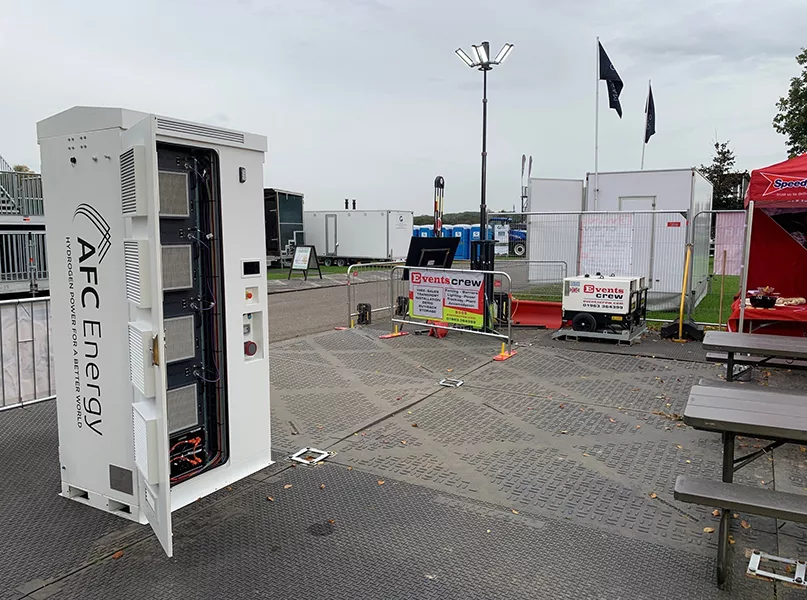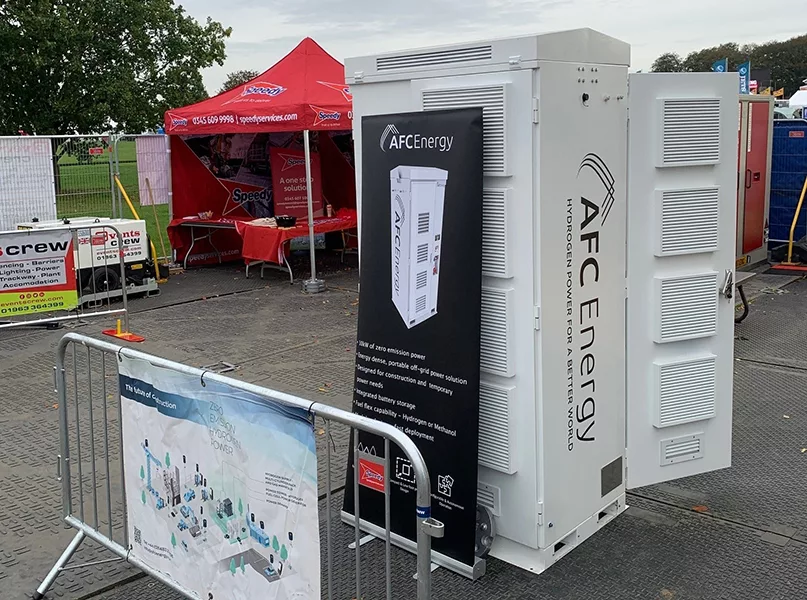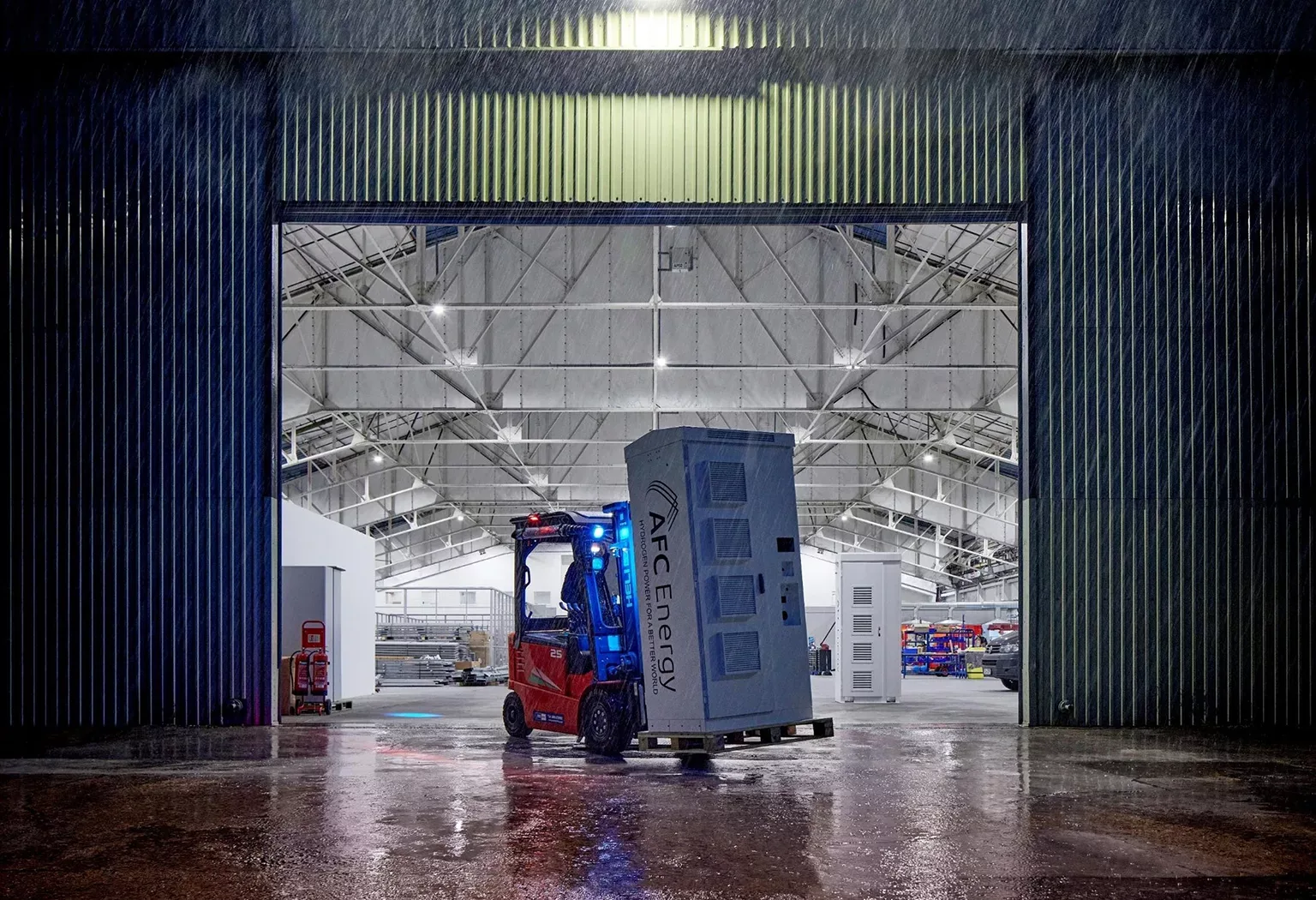Speaking to Adam Bond, CEO of AFC Energy, we learn how the company is reducing the reliance on non-renewable fuel sources by creating innovative H-Power generators, changing the game in fuel generation and consumption.
HARNESSING THE POWER OF HYDROGEN
AFC Energy, a UK-based company, has a vision to displace outdated diesel generators with a commercial and technically viable alternative, fuelled by clean hydrogen.
Widely recognised as an innovator in the field and listed on the London Stock Exchange (LSE), AFC Energy has recently launched a H-Power range of highly efficient fuel cell power generators, which are zero emission, no smell, and can be used by customers in the most extreme environmental conditions.
The H-Power generator is positioned within an abundant fuel cell technology market; however, unlike other producers, the company has created its own technology platform and packaging for primary use, differentiating itself in a USD$20 billion off-grid power market.
“We are not designing our technologies for use in vehicles, trucks, and buses, which continue to see challenges in balancing the need for refuelling infrastructure. Rather, our systems leverage existing hydrogen supply and logistics capabilities that do not require a dense network of refuelling stations to be successful,” introduces CEO, Adam Bond.
Rather than utilising existing and logistically challenging infrastructure, the H-Power generators have been designed and built through close interaction with construction companies and off-grid power customers and partners, who provide real-time insights into the nuanced design of generators.
“Our infrastructure has operated from the deserts of Saudi Arabia through to the glaciers of Greenland, providing real insights into the vast environmental demands of the off-grid power market,” highlights Bond.
Moreover, the scale of the equipment in the market also means that there is scope to grow the number of generators quickly, which results in cost reduction and subsequent cost parity to diesel generators.
FUEL FLEXIBLE
As the worldwide provision of fuel transitions towards cleaner power, alternative resources such as hydrogen are seen as key contenders, however, the infrastructure in place needs to change if this is to be adopted into the mainstream.
When compared to hydrogen, diesel could be viewed as the ideal fuel – it is energy dense, commoditised in price, and readily available worldwide. As it stands, hydrogen exhibits few of these properties.
This is changing, however, with the advances in hydrogen storage technologies, increased pressure ratings resulting in better storage and transportation, alongside growth in logistics capabilities. By providing off-grid power, AFC Energy is benefiting from an industry-wide shift in investment with its customers.
Furthermore, the presence of hydrogen in existing commoditised chemicals such as ammonia, utilised worldwide within the fertiliser industry, can be used as a hydrogen-carrier fuel as its density is more closely aligned to that of diesel.
“Ammonia has no carbon and when cracked, creates a nitrogen and hydrogen stream which can be used within the company’s H-Power generators,” Bond expands.
“For this reason, we have invested heavily in ammonia cracking technology which enables our generators to benefit from a flexible approach to fuelling, utilising either hydrogen or ammonia as its primary feedstock.”
This fuel-flexible approach gives AFC Energy’s customers greater choice when selecting preferred fuelling strategies, which harnesses the worldwide availability of ammonia, alongside the growing use of hydrogen.

CRACKING CAPABILITIES
Last year, the company designed, built, and commissioned a demonstration cracking plant. The facility was purpose-built to produce fuel cell grade hydrogen at a rate of 400 kilogrammes (kg) per day at a fraction of the power consumed by an equivalent electrolyser.
As a result, the plant will produce an ideal source of hydrogen, whether it’s used for stationary or maritime applications.
The Hydrogen Council forecasts that the vast majority of the gas needed to reach the goal of carbon neutrality by 2050 will be transported over long distances, with hydrogen derivatives like ammonia expected to account for 45 percent of the expected fuel usage.
As such, AFC Energy’s next steps involve creating a mobile version of the cracker unit to progress its existing commercialisation discussions. This is particularly the case for the negotiations with a trading arm of one of Europe’s largest energy organisations, with which the company has signed a limitation of liability (LOL) agreement previously.

ACHIEVING GOALS COLLABORATIVELY
Elsewhere, AFC Energy is spearheading the deployment of hydrogen power chargers through its recent joint venture with Speedy Hire (Speedy), who will be able to offer the company’s fuel cell generators as a sustainable, alternative off-grid power solution.
As the UK and Ireland’s leading provider of specialist equipment for the construction sector and temporary power markets, Speedy will rent and distribute AFC Energy’s H-Power generators to its customers and will also source and provide the hydrogen fuel.
“It is a potential gamechanger for the adoption of hydrogen fuel cells in the construction industry,” excites Bond.
“Speedy’s customers have already shown strong interest in changing tender requirements and emission regulations, where UK infrastructure and construction projects are targeting the removal of diesel generators by 2029.”
The company has also recently signed an exclusive dealership agreement with TAMGO, a member of the Zahid Group in Saudi Arabia, to cover its business in the Middle East and Northern Africa (MENA) region and displace the adoption of diesel generators on construction sites.
“This is potentially one of the world’s largest hydrogen markets, and with strong decarbonisation targets already in place across much of the region, TAMGO and AFC Energy is positioning itself as the largest suppliers of hydrogen power generators in the region,” Bond adds.
Looking to the following year, the company greatly anticipates the launch of its first 20 kilowatt (kW) and 200kW power generators into the market.
It also plans to secure its supply chain to ensure competitive and scaled manufacturing capabilities that meet the growing demand for H-Power generators.
“We plan to do this through a combination of strategic partnerships within our sub-assembly supply chain and a modest investment into our on-site assembly capabilities,” Bond details.
Alongside this, AFC Energy looks to replicate its existing MENA and UK agreements with TAMGO and Speedy partnerships in other parts of the world, building on the incumbent dealership model currently used within the diesel generator market worldwide.
“The construction sector is the initial focus of our business, but the market potential is huge, extending to electric vehicle charging in remote locations and critical backup power, as well as expanding into the maritime sector,” closes Bond.




















